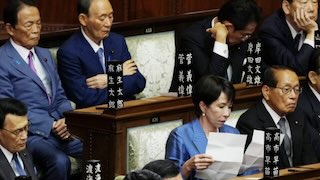TOKYO, Jul 10 (News On Japan) - With Japan facing a labor shortage due to its aging population, immigration policy has emerged as a key issue in the upcoming Upper House election in July. On July 9th, the topic was discussed in depth by news program “It!”, which highlighted public concerns and political stances regarding the role of foreign nationals in Japanese society.
Several recent incidents have sparked debate, including the ease with which foreign driver’s licenses are converted to Japanese ones, and rising tensions around property ownership by foreigners. At a licensing center in Fuchu, Tokyo, a large number of Chinese nationals were seen lining up early in the morning to complete the conversion process. Critics point out that the written test is comparatively easy and that possession of a Japanese license facilitates the issuance of an international driving permit valid in over 100 countries.
Another issue gaining attention involves sharp rent hikes in a Tokyo apartment building after ownership changed hands to a company registered in China. Tenants reported that rents were being raised to as much as 260–320% of previous levels, with one example rising from 72,500 yen to 190,000 yen. Although the hikes were ultimately withdrawn, concerns remain that such moves could be part of attempts to convert properties into short-term rentals, a trend that has caused friction in some neighborhoods.
Additional concerns include fraudulent resale practices at duty-free stores and rising instances of foreign nationals failing to pay into Japan’s medical insurance system. In response, Prime Minister Ishiba announced on July 8th that the government will set up a new administrative unit next week to address these issues and review relevant policies.
The ruling Liberal Democratic Party is calling for stricter regulation of driver’s license conversions and foreign real estate ownership. The Constitutional Democratic Party supports improving employment systems for foreign workers. Komeito emphasizes regional tourism and protection of foreign residents’ rights, while Nippon Ishin no Kai proposes centralized national control of immigration policy. Other parties, such as the Japanese Communist Party, advocate expanded protections for foreign workers and asylum seekers. The Democratic Party for the People wants legal restrictions on land ownership and reforms to the duty-free system.
Reiwa Shinsengumi opposes the reliance on low-wage foreign labor and calls for the abolition of the Immigration Control and Refugee Recognition Act. The Sanseito party promotes a “Japan First” approach and the creation of a new immigration policy agency. The Social Democratic Party supports building a multicultural society, while the Japan Conservative Party seeks to revise the immigration law and review business management visas.
While some public criticisms of foreign nationals are based on real issues, the spread of misinformation and exaggerated claims—particularly on social media—has been flagged as a concern. Some of these narratives risk fostering xenophobic sentiment, prompting calls for fact-checking and balanced reporting.
“It’s important to recognize that many foreign nationals live, work, or visit Japan as tourists, and a nuanced, inclusive approach is needed,” said anchor Miyaura. “We see foreign staff in our daily lives, like at convenience stores, so we must not base judgments on impressions alone,” added anchor Miyaji.
Commentator Patrick Harlan noted, “Japan tends to assume good intentions in policy-making, but systems should be designed to prevent abuse—based on actual data, not fears.”
Behind this growing focus on immigration policy is Japan’s deepening labor shortage, according to Fuji TV’s political editor Soichiro Nishigaki. While some advocate for coexistence with foreign workers, others stress regulation out of concern for public safety or wage stagnation. As a result, political parties remain divided in their approaches, and voters are paying closer attention to where each party stands.
Source: FNN















